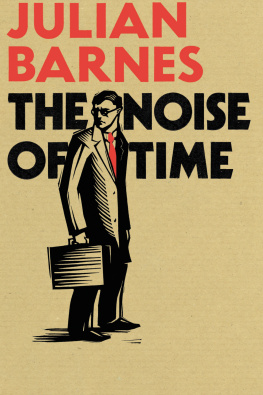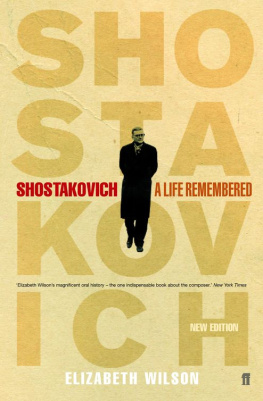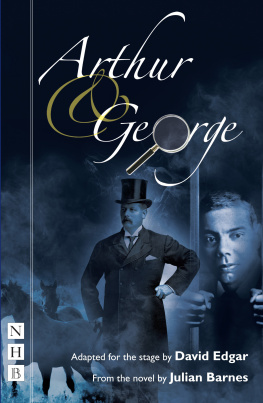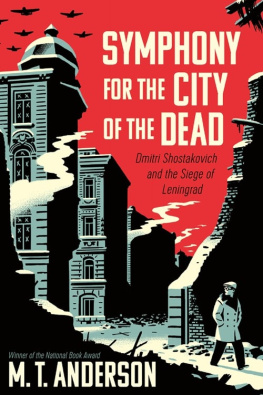Contents
Contents
Also by Julian Barnes
FICTION
Metroland
Before She Met Me
Flauberts Parrot
Staring at the Sun
A History of the World in 10 Chapters
Talking it Over
The Porcupine
Cross Channel
England, England
Love, etc
The Lemon Table
Arthur & George
Pulse
The Sense of an Ending
NON-FICTION
Letters from London 19901995
Something to Declare
The Pedant in the Kitchen
Nothing to be Frightened of
Through the Window
Levels of Life
Keeping an Eye Open
TRANSLATION
In the Land of Pain
by Alphonse Daudet
About the Book
In May 1937 a man in his early thirties waits by the lift of a Leningrad apartment block. He waits all through the night, expecting to be taken away to the Big House. Any celebrity he has known in the previous decade is no use to him now. And few who are taken to the Big House ever return.
So begins Julian Barness first novel since his Booker-winning The Sense of an Ending. A story about the collision of Art and Power, about human compromise, human cowardice and human courage, it is the work of a true master.
About the Author
Julian Barnes is the author of twelve novels, including The Sense of an Ending, which won the 2011 Man Booker Prize for Fiction. He has also written three books of short stories, Cross Channel, The Lemon Table and Pulse; four collections of essays; and two books of non-fiction, Nothing to be Frightened Of and the Sunday Times Number One bestseller Levels of Life. He lives in London.
The Noise of Time
Julian Barnes

This ebook is copyright material and must not be copied, reproduced, transferred, distributed, leased, licensed or publicly performed or used in any way except as specifically permitted in writing by the publishers, as allowed under the terms and conditions under which it was purchased or as strictly permitted by applicable copyright law. Any unauthorized distribution or use of this text may be a direct infringement of the authors and publishers rights and those responsible may be liable in law accordingly.
Epub ISBN: 9781473524828
Version 1.0
1 3 5 7 9 10 8 6 4 2
VINTAGE
20 Vauxhall Bridge Road,
London SW1V 2SA
Jonathan Cape is part of the Penguin Random House group of companies whose addresses can be found at global.penguinrandomhouse.com.

Copyright Julian Barnes 2016
Julian Barnes has asserted his right to be identified as the author of this Work in accordance with the Copyright, Designs and Patents Act 1988
First published by Jonathan Cape in 2016
www.vintage-books.co.uk
A CIP catalogue record for this book is available from the British Library
ISBN 9781910702604
for Pat
One to hear
One to remember
And one to drink.
traditional
It happened in the middle of wartime, on a station platform as flat and dusty as the endless plain surrounding it. The idling train was two days out from Moscow, heading west; another two or three to go, depending on coal and troop movements. It was shortly after dawn, but the man in reality, only half a man was already propelling himself towards the soft carriages on a low trolley with wooden wheels. There was no way of steering it except to wrench at the contraptions front edge; and to stop himself from overbalancing, a rope that passed underneath the trolley was looped through the top of his trousers. The mans hands were bound with blackened strips of cloth, and his skin hardened from begging on streets and stations.
His father had been a survivor of the previous war. Blessed by the village priest, he had set off to fight for his homeland and the Tsar. By the time he returned, priest and Tsar were gone, and his homeland was not the same. His wife had screamed when she saw what war had done to her husband. Now there was another war, and the same invader was back, except that the names had changed: names on both sides. But nothing else had changed: young men were still blown to bits by guns, then roughly sliced by surgeons. His own legs had been removed in a field hospital among broken trees. It was all in a great cause, as it had been the time before. He did not give a fuck. Let others argue about that; his only concern was to get to the end of each day. He had become a technique for survival. Below a certain point, that was what all men became: techniques for survival.
A few passengers had descended to take the dusty air; others had their faces at the carriage windows. As the beggar approached, he would start roaring out a filthy barrack-room song. Some passengers might toss him a kopeck or two for the entertainment; others pay him to move on. Some deliberately threw coins to land on their edge and roll away, and would laugh as he chased after them, his fists working against the concrete platform. This might make others, out of pity or shame, hand over money more directly. He saw only fingers, coins and coat-sleeves, and was impervious to insult. This was the one who drank.
The two men travelling in soft class were at a window, trying to guess where they were and how long they might be stopping for: minutes, hours, perhaps the whole day. No information was given out, and they knew not to ask. Enquiring about the movement of trains even if you were a passenger on one could mark you as a saboteur. The men were in their thirties, well old enough to have learnt such lessons. The one who heard was a thin, nervous fellow with spectacles; around his neck and wrists he wore amulets of garlic. His travelling companions name is lost to history, even though he was the one who remembered.
The trolley with the half-man aboard now rattled towards them. Cheerful lines about some village rape were bellowed up at them. The singer paused and made the eating sign. In reply, the man with spectacles held up a bottle of vodka. It was a needless gesture of politeness. When had a beggar ever turned down vodka? A minute later, the two passengers joined him on the platform.
And so there were three of them, the traditional vodka-drinking number. The one with spectacles still had the bottle, his companion three glasses. These were filled approximately, and the two travellers bent from the waist and uttered the routine toast to health. As they clinked glasses, the nervous fellow put his head on one side the early-morning sun flashing briefly on his spectacles and murmured a remark; his friend laughed. Then they threw the vodka down in one go. The beggar held up his glass for more. They gave him another shot, took the glass from him, and climbed back on the train. Thankful for the burst of alcohol coursing through his truncated body, the beggar wheeled himself towards the next group of passengers. By the time the two men were in their seats again, the one who heard had almost forgotten what he had said. But the one who remembered was only at the start of his remembering.














